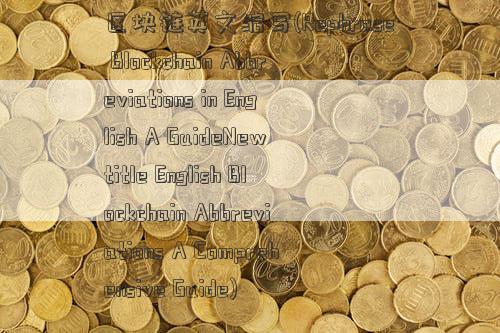区块链英文缩写(Rephrase Blockchain Abbreviations in English A GuideNew title English Blockchain Abbreviations A Comprehensive Guide)
Introduction
In the world of blockchain technology, the use of abbreviations is quite common. Communicating ideas clearly and concisely is important, and abbreviations allow for that. However, for those unfamiliar with the field, deciphering these abbreviations can seem like a daunting task. In this comprehensive guide, we will aim to demystify the most commonly used blockchain abbreviations.
What are Blockchain Abbreviations?
Blockchain abbreviations are shortened versions of words or phrases that are commonly used in the blockchain space. These abbreviations are used to make communication more efficient and to save time. Some of the most common blockchain abbreviations include BTC (Bitcoin), ETH (Ethereum), and ICO (Initial Coin Offering).
Common Blockchain Abbreviations
Below is a list of some of the most commonly used blockchain abbreviations:
BTC - Bitcoin
ETH - Ethereum
LTC - Litecoin
XRP - Ripple
ICOs - Initial Coin Offerings
DApps - Decentralized Applications
DAO - Decentralized Autonomous Organization
DLT - Distributed Ledger Technology
PoS - Proof of Stake
PoW - Proof of Work
AML - Anti-Money Laundering
KYC - Know Your Customer
Less Common but Useful Blockchain Abbreviations
In addition to the commonly used blockchain abbreviations, there are also less common but useful ones worth knowing:
BUIDL – A misspelling of “build” referring to the notion that people should focus on creating products and services instead of solely holding cryptocurrencies.
DEX – Decentralized exchange
DeFi - Decentralized Finance
ERC-20 - Ethereum Request for Comment 20, a technical standard used for smart contracts on the Ethereum blockchain
OXT – Orchid Protocol, a decentralized VPN powered by the Ethereum blockchain
P2P - Peer-to-Peer
SAT - Satoshi, the smallest unit of Bitcoin
STO - Security Token Offering
Importance of Knowing Blockchain Abbreviations
Knowing blockchain abbreviations can be incredibly helpful when discussing blockchain technology with others, whether in person or online. Understanding these terms can also help you stay informed about the latest news and developments in the blockchain space. Moreover, many job positions in the blockchain field require familiarity with these abbreviations, so those seeking a career in this field should make it a priority to learn them.
Conclusion
Blockchain technology is a complex field, and abbreviations are just one aspect that can make it seem even more confusing. However, by taking the time to learn the most commonly used blockchain abbreviations, you can better understand the language and conversation surrounding this emerging field. By familiarizing yourself with these abbreviations, you’ll be able to communicate more easily with others, stay informed, and potentially pursue a career in this exciting field.











